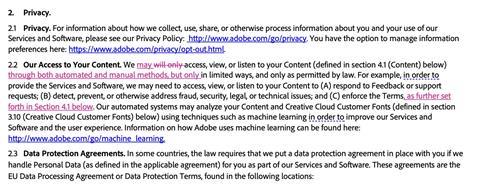Users had become worried after changes to the terms of service

Adobe has clarified that customer content from its Creative Cloud products won’t be used to train its Firefly AI products.
Some users had become worried about the prospect after changes to the company’s terms of service claimed it, “may access, view, or listen to your content through both automated and manual methods”. Adobe’s Creative Cloud includes Premiere Pro and After Effects.


In response, Adobe has said that it, “requires a limited license to access content solely for the purpose of operating or improving the services and software and to enforce our terms and comply with law, such as to protect against abusive content.”
Situations when Adobe may access content
- Access is needed for Adobe applications and services to perform the functions they are designed and used for (such as opening and editing files for the user or creating thumbnails or a preview for sharing).
- Access is needed to deliver some of our most innovative cloud-based features such as Photoshop Neural Filters, Liquid Mode or Remove Background. You can read more information, including how users can control how their content may be used: https://helpx.adobe.com/manage-account/using/machine-learning-faq.html
- For content processed or stored on Adobe servers, Adobe may use technologies and other processes, including escalation for manual (human) review, to screen for certain types of illegal content (such as child sexual abuse material), or other abusive content or behavior (for example, patterns of activity that indicate spam or phishing).
Adobe went on to reiterate its commitments to not train Firefly AI models on customer content and to never assume ownership of a user’s work.
Adobe design leader Scott Belsky had earlier said on X, “I can clearly state that Adobe does NOT train any GenAI models on customer’s content, and we obviously have tight security around any form of access to customer’s content. As a company that stores cloud documents and assets for customers, there are probably circumstances (like indexing to help you search your documents, updating components used from CC libraries across your documents, among others) where the company’s terms of service allow for some degree of access.”








No comments yet